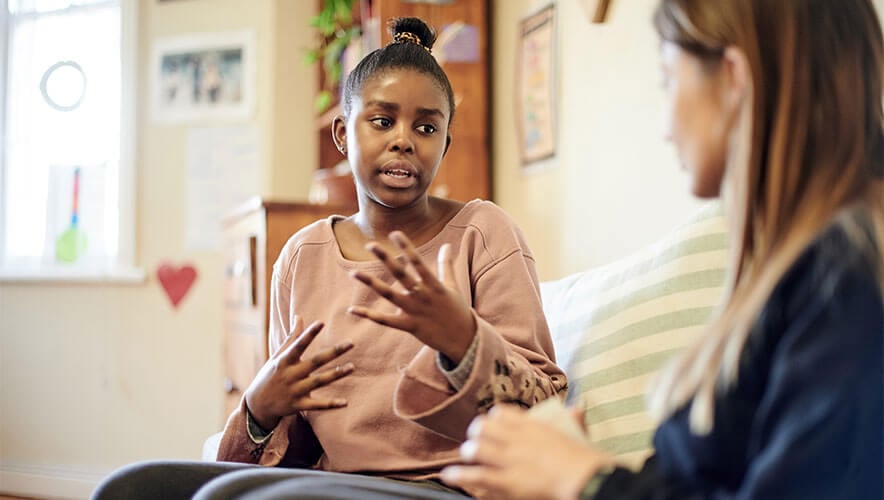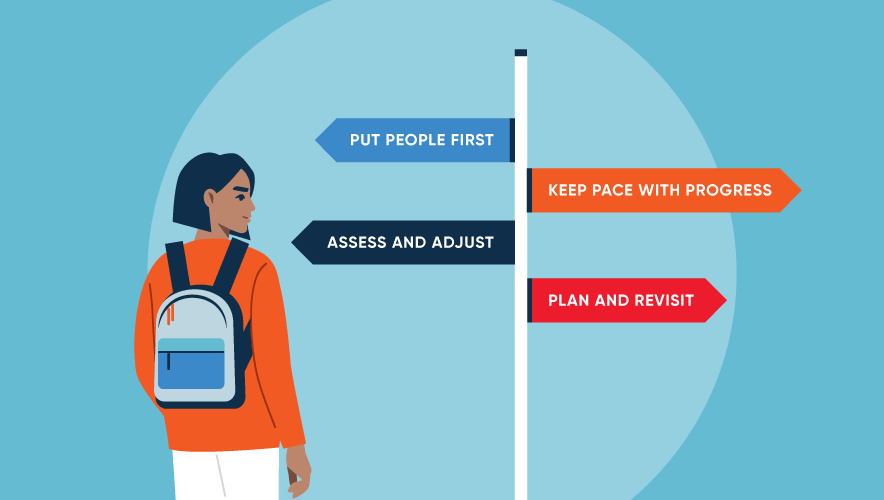How to Build a Best-in-Class Security Culture
What do a sweet transvestite from transsexual Transylvania, a chief HR executive with diarrhea, and cannabis-induced psychosis have in common with having a great workplace security culture?
Connection.
Fortune may favor the brave, but it also favors the compassionate, empathetic, humble, engaging, perceptive, innovative, and trusted business expert and security partner.
Building a sustained security culture starts with the security leader’s ability to emotionally connect, engage, and partner with people at all levels of the organization, from the C-suite to the third-shift frontline associate. Without those abovementioned traits, asking leaders and employees to understand and embrace a security culture can backfire, and your efforts to build a culture will either fail or be insufficient, resulting in a long-term impact on your credibility.
Connection is a full-time occupation, however, and security leaders cannot take it lightly.
Imagine that you’re traveling to a site to do a pending security assessment and other projects. You put in a full day in the office on Monday and plan for an evening flight to the site. You happen to wear a light jacket with your company logo on it to the airport. While sitting at the gate waiting for your plane to board, you notice two people also with your company logos on their backpacks and sweaters, and by coincidence you make eye contact with one of them. What do you do?
The next morning you’re having breakfast at the hotel. You recognize a different colleague from the legal department, but you have never met in person. What do you do?
You pull up to the site’s parking lot and you run into two employees walking in together talking about the Monday night football game. What do you do?
Another employee scans her badge and opens the main door to enter. She turns and looks at you and your ID badge as you swipe the badge reader. What do you do?
As you approach the sign-in desk, you pass an adjacent side-hall entrance, and you look to your left and see a joyous-looking janitor sweeping next to a planted tree. What do you say?
At the desk the receptionist says, "Good morning, may I help you?" What do you say?
Every interaction represents an opportunity to build your personal brand and security culture. You have the precious opportunity to make someone feel good about themselves if you know how to do it, and if it’s part of your DNA.
Now, each company’s culture is a little different, and understanding that your overall company culture will determine the success of your security culture. Having this foundation provides you with a realistic expectation of success and how you will design your strategy and tactics.
So, what about that sweet transvestite, diarrhea, and psychosis? Each of them provides essential lessons on how to build and promote a specific culture.
Focus on Empathy
Would you like to have four hours with 900 members of your legal; HR; internal audit; ethics and compliance; environmental, health and safety (EHS); procurement; and operations departments so they would get to know you, you them, and establish long-lasting relationships?
I developed an innovative way to share one of global security's traditional skill sets—conducting investigative interviewing. All these departments conduct investigations within their roles, so why not share something security is good at to make them better at what they do?
Instead of death by PowerPoint, I start my course with something they have never seen before in an interviewing course. Just a minute and a half video emphasizes that this session will be entertaining, thought provoking, and focused on empathy and compassion. I start my course with an opening visit by a Sweet Transvestite from Transsexual Transylvania—a classic number from the Rocky Horror Picture Show.
Initial reactions range from being shocked to offended to confused to singing along—the video is not what you usually see in a business setting, but it goes to the critical investigative component of personal bias barriers or obstacles. We all have personal biases that, if left unchecked, can impact your ability to objectively seek and obtain the main point of any investigation—the complete truth.
This video is an excellent ice-breaker technique to bring the audience’s biases to surface. Then we discuss how their opinions of what one sees and hears on the screen could hinder the viewer from treating everyone with fairness, respect, and empathy. In the clip, Tim Curry sings, “Don’t get strung out by the way I look! Don’t judge a book by its cover!” People are often overwhelmed by what they are seeing on the screen, and they do not listen to and process these words of wisdom in the moment—until we discuss them in the session.
The rest of the course is full of video samples of well-known people (for example, did Tom Brady know air was taken out of the footballs during a 2014 football championship?) exhibiting various types of deceptive behavior.
In 10 years, I have taught the course more than 40 times at my organization’s corporate headquarters as well as at field operations and at annual meetings around the world. Two days after the first of these courses in Puerto Rico, the vice president of HR sent me a note saying she applied the methods and determined someone was untruthful during an investigation.
Each time I encounter someone who provides positive feedback and asks for additional training is one more affirmation that I am contributing to my colleagues and the business. When it comes from a business leader, “I want that training or service” are some of the sweetest words for a security leader to hear, and this outreach is the best advocacy to building security cultures.
Personal Commitment
Setting the tone for company culture can also come down to personal compassion. Years back I provided executive protection for some senior leaders, including the chief human resources officer (CHRO), for a three-day operations review of sites in Latin America. We traveled on the corporate aircraft and planned for health contingencies, especially the most common one—food poisoning. Unfortunately, the CHRO fell ill on the second day.
Prior to boarding our vehicles for the 45-minute drive from the hotel to a site, I had checked with each of the travelers and noticed the CHRO did not look well, but she insisted on heading out. I discreetly informed our two drivers of the situation, and they assessed potential emergency stopping points. Twenty minutes into the trip, a stop was urgently required—many of us have been there and know how painful, miserable, and embarrassing it can be. The drivers quickly turned back a couple of miles to a toll road booth with a rest stop. The drivers had even brought toilet paper in case the stall was out. The executive was offered Imodium, and she made it through the trip without additional problems.
After this incident, our relationship was extremely positive, and she was a crucial leader in setting the tone at the top regarding our company security culture and supporting all aspects of our program. Preparedness and compassion help to secure strategic allies, as well as a broader cultural shift.
Sharing Your Experience
The last example of innovation, compassion, and empathy concerns mental health.
Several years ago, during their university studies, one of my children experienced a psychotic episode triggered by several years of self-medicating their depression with marijuana. Our child had started vaping THC cartridges, which can have up to 80 percent THC concentration. This landed them in a mental health hospital for two weeks.
My family’s lives changed forever upon a diagnosis of cannabis-induced psychosis, something that mimics or can even cause bipolar disorder. Since this diagnosis, I immersed myself day and night learning about all things mental health. The National Alliance on Mental Illness (NAMI), along with therapy, were lifesavers in helping us understand what our family’s journey forward would be like.
In 2020, I decided to help others by obtaining a NAMI certification as a family support group facilitator. These groups are made up of family members of people with a mental health diagnosis, and we come together in small groups to provide empathic support, education, and guidance. Helping others in this way has been the best thing for my soul…ever. But it could help a broader audience.
I shared my story with a vice president at my company, and she asked me to begin similar programs at work. The goal was to help colleagues break through the stigma barrier, and to better understand their mental health journey, as well as leverage available resources like employee assistance programs (EAPs) and local NAMI groups.
Security professionals understand the connection mental health has to comprehensive workplace violence prevention programs, including ones that address suicide and bullying risks. This has been an incredible opportunity to partner with the human resources and benefits departments and hundreds of colleagues at all levels in the organization.
If you are dealing with a mental health challenge—either for yourself or a member of your family—please contact NAMI for free resources or reach out to the author, John Rodriguez, for non-judgmental peer support.
Patience Pays Off
These cases represent just three examples of ways and opportunities to help develop your personal brand and your company’s security culture for a great workplace. There are many more things you can do to help others at work, build your brand, and have a best-in-class security culture. Most importantly, it takes time to develop and sustain one.
Developing and fomenting a best-in-class security culture takes years, and cultures are built one interaction at a time, over time. The entire security department must be united in this approach. Having just one member on your team not believing in this philosophy and wanting to be the corporate cop can set your culture building effort back to square one or even be such an impediment that they drive top talent away from your security department.
Each and every contact you have with a work colleague is an opportunity to do that and be seen as friend, not a foe.
In closing, it all comes down to your feelings about people, especially people different from you, your self-awareness and make-up, your humility, empathy, and compassion, and lastly, your overall attitude towards life and understanding of what a strong security culture can do for a company’s employee security and business successes.
John Rodriguez has 40 years of corporate security experience with major global corporations including General Motors, Levi Strauss & Co., Kimberly-Clark, and Cardinal Health. He was CSO for Temple-Inland in Austin, Texas, and had a security management consultancy firm supporting more than 100 Fortune 500 companies from 1995 to 2004. Rodriguez is currently global security director with Cardinal Health, and he also provides consulting, training, and mentoring services with his company Empathic Security Cultures LLC.












